Best Midi Controller Keyboards to create music, be it in your home studio or in a professional studio. An essential gear for today’s home studio, a controller keyboard allows you to easily control your DAW, VST plugins, and other synths.
Introduction to Midi Controller Keyboards
Why You Need a Midi Controller Keyboard?
If your sole purpose is to create music with a keyboard, you really do not need an expensive keyboard with built-in sound engine, a MIDI controller keyboard should do the job.
A midi controller keyboard makes it easy to record music on a computer, and lets you easily control various recording related parameters within the recording software.
These keyboards cannot generate sound of its own, but it can send MIDI messages.
A MIDI controller will work with any other equipment that accepts MIDI input (MIDI is the protocol using which digital music tools communicate).
So, instead of using an arranger keyboard or synth/workstation, you can also use a midi controller along with software sequencer and sound libraries to create songs.
A controller keyboard comes with lots of faders, knobs, sliders and buttons that make it easy to control the various sound related parameters.
For instance, you can turn the knob to add more treble or bass to the sound.
It is much easier to use these to manipulate the sounds, instead of doing it using the software (using the mouse).
Instead of having to manually enter data into a music recording program (using mouse clicks), a midi controller keyboard allow you to input pitch, rhythm, and velocity information in real time using the keys (and the various controls) of the keyboard.
Just press a note and it will play in the sequencing software on your computer; hit record, and you will start recording.
Those who do a lot of programming find it difficult to program if the keyboard lacks dedicated programming buttons. For them, lots of knobs and features are always welcome.
Controllers can also be programmed to control other synths in your studio/performance chain.
Related: Various types of midi controllers.
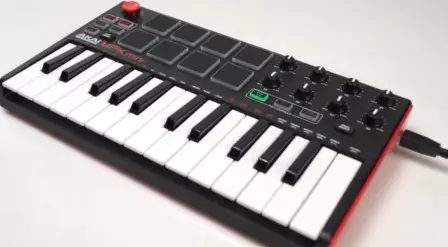
Preferred by other musicians as well
A midi keyboard controller is preferable over the regular music keyboard if you want to do music related stuff on a computer.
It is easier to play notes on a keyboard and to trigger software based sounds. Playing a soft synth (VST) with a MIDI controller keyboard is pretty much like playing a real instrument,
As a result, a midi controller keyboard is used a lot by other musicians. It is a useful component of your recording studio and perfect for composers, arrangers, producers, guitar players and DJs .

Midi controller keyboards are cheaper
MIDI controller keyboards are cheaper than synthesizers and arranger keyboards, and available for a fraction of the price (since they do not have the ability to produce sound by themselves).
In case you are facing this dilemma of choosing between a controller and an arranger or a synth, just remember that if you’re mostly going to work with sound libraries and do recording on computer, a controller will suit fine.
You can even use your existing music keyboard as controller.
In case, you already have a keyboard instrument, you need not buy a separate midi controller as most music keyboards (and synthesizers/workstations) can be used as a midi controller as well.
Even if your keyboard has limited polyphony it should be fine as long as the keyboard can send MIDI data. The polyphony is for the sound engine of the digital piano keyboard and won’t impact the MIDI messages that the keyboard sends out.
Midi controller keyboards are portable and require less space
Midi controller keyboards are available in various sizes – 25 keys, 37 keys, 49keys, 61 keys or even the 88-key keyboard.
The compact MIDI controllers don’t occupy a lot of space on your recording desk. You can easily dump your laptop, soundcard and MIDI controller keyboard in a bag and carry your recording studio along with you.
If you spend a lot of time in the studio, you will agree that bigger sized keyboards can be difficult to accommodate. In most studios, there’s hardly any space for a considerable size keyboard between the monitors and the other gear.
While you may own a top of the line 88-key workstation keyboard, at times, it just is not feasible to have it in your studio, on your desk.
Placement of equipment is important, especially if you are working musician, for you to be more efficient. That’s why smaller MIDI controllers (37 and 25 keys), and the ones with built-in audio interface, are becoming popular.
If you want a really mobile setup or are cramped for space, you may consider midi controller keyboard with built-in audio interface. It usually includes a built-in preamp and so you can connect a microphone and get started.
The advantage is that you have one less equipment to deal with in your setup and it saves you desk-space as well.
If you often meet clients to give demo of your musical ideas, a compact setup is preferable than hauling around larger equipment. The smaller ones are portable, and some even come with very playable MPC pads.
However, if you have space in your studio, by all means go ahead and use the bigger ones!
There are many who use both a compact controller (usually placed just below the computer screen) and their full-sized synth workstation (place on the side).
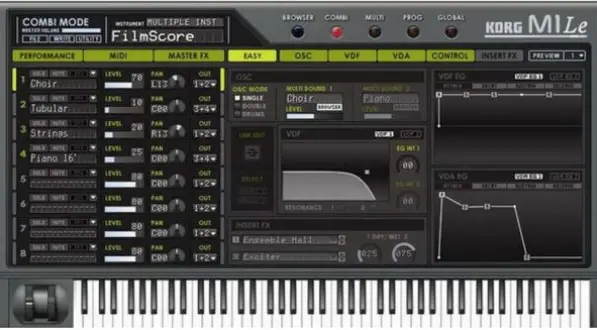
You get keyboard controllers with velocity sensitive or weighted keys as well, which suits piano and/or organ players.
Piano players prefer weighted keys. They basically want a bigger keyboard, but with much fewer buttons, something that is close enough to a piano.
You do get 88 key controllers that come with the minimum necessary buttons including the wheels, and have keys that offer similar resistance to the key on a piano. Piano players can use these to play or create classical stuff using these controllers.
Those who have played on keyboards like Yamaha or Casio before might find the controller keys a bit “springy” in the beginning. But as you get used to it, you may in fact start liking that action because of their nice and subtle responsive nature.
USB Midi Controller Keyboards
Most midi connections nowadays are getting USB based, so if you prefer a similar setup you may choose to buy USB midi controller keyboard, else you may choose one that comes with a 5-pin MIDI connector.
A USB controller keyboard just needs to be plugged into the USB port of your computer and you are instantly setup for some action.
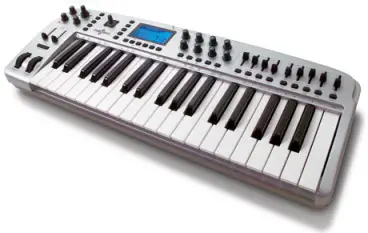
Buying a Controller Keyboard: Things to Look For
Modern controller keyboards are quite powerful and are capable of doing a lot of things. Here are some of the features that you can expect on these midi controllers. Things to keep in mind when looking for midi controllers:
- Keys need to be Velocity-sensitive (responds to how hard or how soft you’ve pressed the keys).
- After-touch. MIDI data sent after the key has been struck, while it is being held down or sustained. Aftertouch is often routed to control vibrato, volume, and other parameters.
- Key action. You can choose from a range of action – unweighted, semi-weighted and weighted hammer action (emulates keys of a real piano). Not only are these available in various number of keys, you also have the option to choose between the normal synth keys, semi-weighted, or weighted keys.
- In terms of keys, you usually have choices of 25, 37, 49, 61, 73, 76, 88 key keyboards. You also have choices of weighted and semi-weighted keys with after-touch.
- More Control: These are designed to give you complete control over your music making software. Most leading brands have worked with some of the most popular DAWs to ensure that the knobs, faders and buttons can control all the things that you need to control in the software (such as your plug-in instruments and FX). You can map the various faders, knobs and buttons of the keyboard to the various functions within the sequencer software.
- Most are USB powered so they don’t need to be powered separately.
- You have provisions to connect expression and sustain pedal inputs
- MIDI in and out ports are provided for connecting external MIDI instruments
- Most MIDI controllers have a full control surface and some may also thrown in some freebie software that makes it fast and simple to assign knobs, faders and buttons to your music software.
- Big LCD screen: One you start working with several features, it can get a bit confusing as to what knob is controlling what feature. This is where a keyboard with a big LCD screen can really help. Controllers with big display screens show you instantly what each control is assigned to. The screen shows what knob is assigned to what part of the software so you don’t have to look at the software GUI for this.
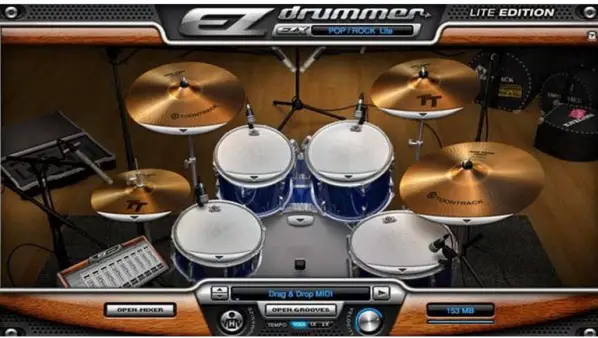
Overall, you need to buy one that fits your requirement (space as well as budget) and has the features you desire.
Best Midi Keyboards
Here are the best MIDI controller keyboards available for your creative needs. We have reviewed 49 key, 61 key, 88 key, compact and USB midi controllers.
- Best High-End (Novation Launchkey 49-key)
- Best Mid-Range (Akai Pro MPK Mini MKII 25Keys)
- Best Inexpensive (Akai Professional LPK25)
Akai MPK Mini MK3
 The Akai Professional MPK Mini MK3 is a 25-Key USB MIDI Drum Pad & Keyboard Controller. Its now easy to have your own portable studio; create and perform music anywhere you like with this controller that easily fits in a laptop bag. A fantastic little controller (features slightly smaller sized keys), 8 pads , features a thumbstick (joystick) for pitch and mod control.
The Akai Professional MPK Mini MK3 is a 25-Key USB MIDI Drum Pad & Keyboard Controller. Its now easy to have your own portable studio; create and perform music anywhere you like with this controller that easily fits in a laptop bag. A fantastic little controller (features slightly smaller sized keys), 8 pads , features a thumbstick (joystick) for pitch and mod control.
This USB keyboard controller is perfect for quickly entering notes and phrases into your computer. You can do much more with this controller such as easily shift the notes an Octave Up and Down by just pressing a button, create music in different time signatures and create interesting patterns with the built-in Arpeggiator.
The 25-key AKAI is perfect for those looking for a compact midi keyboard.
Novation Launchkey 49 USB Keyboard Controller
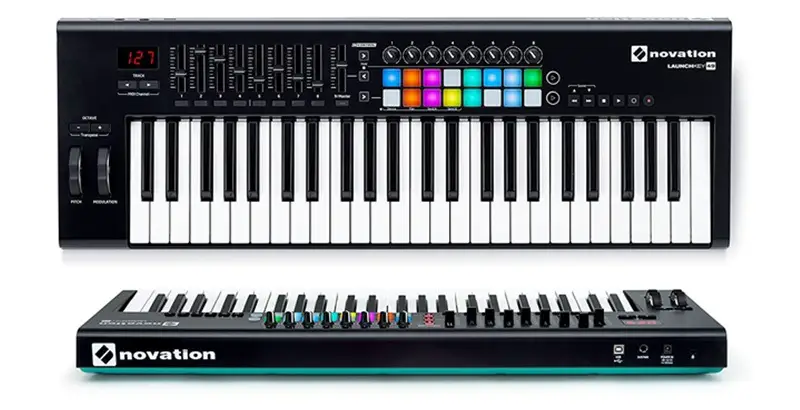
Launchkey is an easy-to-use MIDI keyboard controller, specially designed for use with Ableton Live; its pads and buttons let you easily control all the major software functions. It is fully USB bus-powered and works straight away, without needing power supply or drivers on Mac or PC. You can choose between 25, 49, and 61-note versions.
Akai Pro LPK25 25-Key
The Akai Pro LPK25 is about a foot long but has several features including an arpeggiator, sustain button, and tap tempo. Weight: 1.6 pounds. Its a scaled-down version of the MPK series of keyboard performance controllers, Read more…
The affordable Akai LPK25 is a portable midi controller, best suited for on-the-go use. It however lacks features to be used as part of serious home studio setups. Its overall construction is mediocre but then its also priced on the lower side. But its a nice, cheap portable midi controller.
Korg Microkey 25
Another portable, 25-key midi controller, this one from Korg. Great for recording, and also a great help during performances (you can trigger various sound samples/virtual instruments on stage). Weighs only 1.6 pounds, bus powered.
M-Audio Oxygen 49-Key USB MIDI Controller
M-Audio Oxygen 49-Key comes with 49-keys. Good intuitive layout with the transport buttons conveniently-placed. The Oxygen 49 features eight assignable knobs and nine assignable sliders, plus dedicated transport and track select buttons make it perfect for both production and performance. The DirectLink mode automatically maps these controls to common DAW functions. Built-in factory presets offer support for popular virtual instruments right out of the box so there’s no complicated setup required.
Alesis V49 (49 Keys)
Alesis V49 is quite popular among bedroom producers, bus powered, four assignable knobs and buttons, eight impact-sensitive backlit pads. some users have complained that the drum pads are a bit fussy to use. Included software lets you adjust various parameters. Programmable inputs. Weight: 8.1 pounds. Available in 25 keys, 49 keys, 61 keys.
Alesis Q88 (88 Keys)
Alesis also has an 88-key midi keyboard – the Alesis Q88 which comes with pitch bend, modulation, and octave controls, as well as sustain and auxiliary pedal inputs. It features 88, semi-weighted velocity-sensitive keys.
Plug-and-play operation. Ableton live lite software included. Weight: 23 pounds
Nektar LX49+ (49 Keys)
The Nektar LX49+ is a fairly recent model and has quickly gained in popularity among traveling musicians and producers. Comes with 49 keys, eight backlit drum pads, nine faders, bitwig DAW. Weight: 9.2 pounds.
Akai Pro MPK Mini MKII (25-Key)
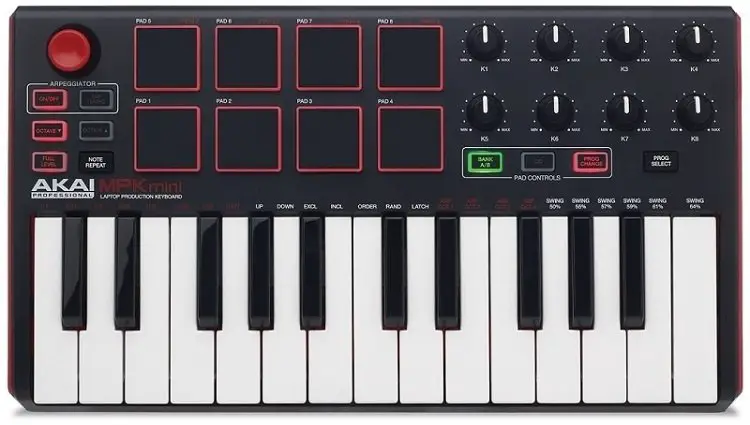
One of the more popular products out there, because of its compact size, flashy design and sturdy build; great for on-the-go production. 25-key velocity-sensitive mini keyboard; ideal for your mobile recording setup. You get MPC-style pads, assignable knobs to adjust virtually any parameter. Read more…
Some may find 25-key setup limiting. It doesn’t have any wheels. But its compact, nice set of features, Free vst download packages included. Weight: 2.1 pounds.
Roland A-800 Pro (61-Keys)
The Roland A-800 Pro is among the better midi keyboards, better suited for recording studio or for live performances. Besides the standard features, it also features 8 onboard dynamic drum pads (for triggering samples). Bus powered. 45 individually assignable controls. Weight: 15.2 pounds. Smaller 32-key version (Roland A-300PRO) is also available.
M-Audio Hammer 88 (Hammer-Action USB Controller)
The M-Audio 88 comes with 88 fully-weighted hammer-action keys. Versatile keyboard with pitch bend, modulation and octave controls, to create layered patches or split regions, Pro tools first software included, Weight: 43.7 pounds.
Works flawlessly with any music creation software. Those who play the piano will like the feel and response of this full 88-key keyboard. It’s bus-powered, so one simple USB cable is the only connection you need to power it. The pitch and modulation wheels plus slider and buttons make it a great controller for playing as well as for programming.
Find Great Deals on MIDI Controller Keyboards here on zZounds
- Compact Keyboard Controllers . 61-Key Keyboard Controllers . 76-Key Keyboard Controllers . 88-Key Keyboard Controllers
Related Accessories
Most of these keyboards only have a couple of ports, the USB and the sustain pedal. You should definitely consider going in for a solid and handy piano style sustain pedal. If you are a Garageband user, you may also want to check out the hugely popular Jam Pack sounds.
Closing Thoughts
MIDI controller keyboards are special because they have really changed the way musicians approach music. It gives live performers & studio musicians a lot of flexibility to play and/or record virtually any synthesized musical instrument. It also allows them to have a portable recording setup which can be carried around in their shoulder bag.Related Posts
- Best 61 Key Midi Controller Keyboards
- Best 88 Key Midi Controller Keyboards
- Best Compact Midi Controller Keyboards
Related: Complete guide on piano and keyboard instruments
KeytarHQ editorial team includes musicians who write and review products for pianists, keyboardists, guitarists & other musicians. KeytarHQ is the best online resource for information on keyboards, pianos, synths, keytars, guitars and music gear for musicians of all abilities, ages and interests.




Leave a Reply